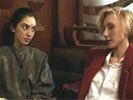Eye For Film >> Movies >> Gang Of Four (1988) Film Review
I'd never heard of Jacques Rivette before I watched this. Turns out he was big in the French New Wave – right up there with Godard and Truffaut and Rohmer. Proper directors – auteurs – who made proper films. Which means, in film-reviewing terms, Rivette is more or less bullet-proof. Slag him off and everyone will immediately mark you down as a knucklehead who doesn't "get" it. You might as well walk up and down the Champs-Élysées carrying a sandwich board with the word "philistine" written on it in big red, white and blue letters. Only you'd probably have to call it a "le sandwich" board. And use the French word for philistine. Whatever that might be.
So, I'm no expert on the New Wave, but it seems Rivette's interpretation of it is pretty obvious – to make films that are completely unwatchable. Not the most obvious modus operandi for someone who's in the business of making movies, but there you go. Rivette seems to have sat down and thought, I know what, I'm going to make films and I'm going to make them as inaccessible as possible and who knows, with a bit of luck, absolutely no one will ever watch them. So they're experimental. They're improvised. They have multiple and contradictory themes and no sense of plot. Most of all, they're very, very long. One of his films – Out 1: Noli Me Tangere, which he made in 1971 – weighs in at an arse-numbing 12 hours and 40 minutes.

Gang Of Four is a relatively svelte two and a half hours, but it feels much longer. It took me a few sittings and most of a weekend to get through it, but I'm better now. Despite the length, the plot, such as it is, is pretty slight. Four would-be actresses share a ramshackle house on the edge of Paris and take acting lessons from a sour-faced teacher called Constance (Bulle Ogier). One of them, Anna (Fejria Deliba), meets a mysterious guy (Benoît Régent) at a photography exhibition and he tells her that her former housemate and acting friend Cecile (Nathalie Richard) is in some kind of trouble and … and, well, that's about it really. I'd like to say I'd better stop there just in case I inadvertently spoil the barnstorming finale, but there's nothing much to give away, so I won't.
When I said Anna meets a "mysterious" guy at the exhibition, what I meant was she meets a creep. A creep called Henri. Only he's not meant to be a creep. He's meant to be enigmatic, a bit of a ladies' man. He offers Anna a drink. "Do I know you?" she asks. To which Henri, bless him, replies, "Everybody knows me. Nobody knows me."
And we're supposed to think, oh how very profound, you floppy-haired little Frenchman, how could Anna possibly resist? What we're really thinking is, Anna, the man's a prat, walk away, now.
Anna is attacked on her way home from the exhibition, not by Henri, though Henri does appear from out of the shadows, just in time to make a limp-wristed attempt to help her. After picking himself up off the floor, he offers to drive Anna home, and, despite the fact that he's just fought like a schoolgirl, continues to play it cool, only this time he hints at something darker – an undercurrent of danger beneath that irresistibly suave façade.
He says he used to make fake IDs, and Anna seems suitably impressed. Now, he says, he's a painter. He paints stolen cars! Yep, he's a bad 'un all right. Anna's not the brightest light in Paris, but even she's beginning to wonder about horrible Henri. At home, Anna tells one of her housemates about the encounter – the housemate says she also met a mysterious man and he gave her the same warning about Cecile.
It's not a bad set-up, actually, but Rivette takes an age to get there and once there he doesn't do much with it. Henri disappears into the shadows and we return to Anna and her housemates. This is not a good thing, because they are probably the four dullest, dreariest women in Paris, so bland they're almost indistinguishable from each other. Mostly we just observe them sitting around their kitchen table, talking, drinking and eating bread and jam. Sometimes they sit in their living room, where they talk and drink and eat bread and jam. Other times we see them in a café, where they talk and drink and eat bread and jam. Mostly, though, we watch them at work, in the theatre, rehearsing a tedious Marivaux production under the ever-watchful eye of the sullen Constance.
This play-within-a-movie gimmick is both tiresome and distracting. Maybe there's a clever-clogs New Wave reason for it – the blurring of the edges between real life and make-believe, perhaps – but it's clunky and heavy-handed. We see Cecile falling apart as her past catches up with her, then watch her on stage, in character, as her emotions get the better of her and she fluffs her lines. Something about art imitating life imitating art. It's not very subtle.
Not only does Rivette persist with this gimmick, but each on-stage interlude becomes more drawn out, more tedious, more pretentious than the one before. "Your past is your head under water," pronounces one character. "In some lives one past follows another without passing into future."
What the hell does that mean? Even Henri wouldn't come out with twaddle like that.
Reviewed on: 27 Feb 2008



















